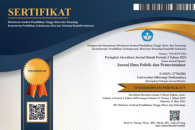Federalisme sebagai Alat Resolusi Konflik: Studi Kasus Bougainville, Papua Nugini
Abstract
Bougainville is an autonomous region in Papua New Guinea which gained its autonomy through The Bougainville Peace Agreement (BPA). The conflict between the Bougainville Revolutionary Forces and the Papua New Guinean army was the worst in the South Pacific Region after World War II. The number of victims is estimated at 20,000 people. This conflict, which has been going on since before PNG became independent, was triggered by the mining issue which is intertwined with land ownership traditions. Civil war broke out in 1988 and ended in 1998 when both parties agreed to make peace. In 2001, Bougainville Peace Agreement was signed, and federalism became one of the "recipes" for resolving the conflict through the provision of broad autonomy on Bougainville. However, in 2019 a referendum was held, and 98 percent of citizens voted for separation from PNG. This research discusses federalism as a conflict resolution tool and questioning why it is not sufficient in the case of Bougainville. This paper will use literature study as research method.
Full Text:
PDF (Bahasa Indonesia)References
Braithwaite, J., Charlesworth, H., Ready, P., & Dunn, L. (2010). Reconciliation and Architectures of Commitment. ANU E Press.
Braun, V. & Clarke, V. (2006). Using thematic analysis in psychology. Qualitative Research in Psychology, 3, 77-101.
Dead Country Stamps And Banknotes. (n.d.). British New Guinea (1884 – 1906). Dead Country Stamps And Banknotes.
ICRC. (2018). Mourning the Missing, Three Decades On. International Committee of the Red Cross (ICRC).
Jeong, H.. (2008). “Understanding Conflict and Conflict Analysis”, Sage Publication
Joint Standing Committee on Foreign Affairs Defence and Trade Australian Parliament. (1999). Bougainville: The Peace Process and Beyond.
Keil, S., & Alber, E. (2020). Introduction: Federalism as a Tool of Conflict Resolution. Ethnopolitics, 19(4), 329–341. https://doi.org/10.1080/17449057.2020.1795469
KumparanNews. (2019). Euforia Rakyat Bougainville Menang Referendum: Kami Terlahir Kembali, Kumparan, terbit 11 Desember 2019, diunduh dari
https://kumparan.com/kumparannews/euforia-rakyat-bougainville-menangreferendum-kami-terlahir-kembali-1sQJmqSxLpN/full pada 28 Mei 2021
May, R. (2005). The Bougainville Conflict and Its Resolution. In John Henderson and Greg Watson, eds., Securing a Peaceful Pacific. Canterbury University Press.
McKenna, Kylie. (2019). Status and implementation of the Bougainville Peace Agreement and implications for referendum. Research Report No 06 Januari 2019, The National Research Institute Papua New Guinea diunduh dari https://www.pngnri.org/images/Publications/Status_and_implementation_of_the_Bougainville_Peace_Agreement_and_implications_for_referendum_.pdf pada 30 November 2023
Mirinka, R. (1994). Development Distortions: the case of Bougainville. In Atu Emberson-Bain, ed., Sustainable Development or Malignant Growth?: Perspectives of Pacific Island Women. Marama Publications.
O’Callaghan, M.-L. (2002). The Origins of the Conflict, Conciliation Resources.
O’Faircheallaigh, C. (1990). The Bougainville Crisis. Policy and Society, 1(1), 30–35. https://doi.org/10.1080/10349952.1990.11876732
Papua New Guinea Map. (n.d.).
Ramsbotham, O., Woodhoyse, T, Miall, H.. (2011). “Contemporary Conflict
Resolution”, 3rd Ed, Polity Press, UK
Regan, A. J. (1998). Causes and course of the Bougainville conflict. The Journal of Pacific History, 33(3), 269–285. https://doi.org/10.1080/00223349808572878
Regan, Anthony. 2018. The Bougainville Referendum Arrangements: Origins,Shaping and Implementation Part One: Origins and Shaping. Discussion Paper 2018/04. Dept. of Pacific Affairs, Research School of Pacific and Asian Studies, The Australian National University
Thompson, H. (1991). The economic causes and consequences of the Bougainville crisis. Resources Policy, 17(1), 69–85. https://doi.org/10.1016/0301-4207(91)90027-S
Tirto.id. (2019). Referendum Bougainville: 98 Persen Pilih Merdeka dari Papua Nugini. Tirto.Id.
United Nations Peacemaker. (2001). Bougainville Peace Agreement. UN Peacemaker.
Wesley-Smith, T., & Ogan, E. (1992). Copper, Class, and Crisis: Changing Relations of Production in Bougainville. The Contemporary Pacific, 4(2), 245–267.
DOI: https://doi.org/10.37058/jipp.v9i2.8834
Refbacks
- There are currently no refbacks.
Copyright (c) 2023 Muhammad Riza Hanafi
View My Stats











